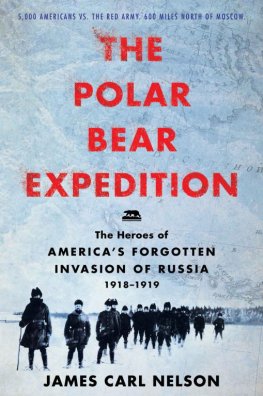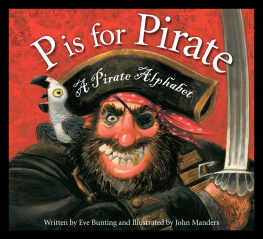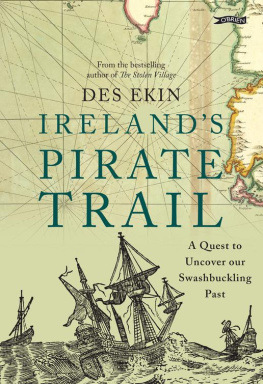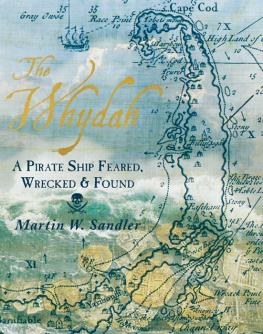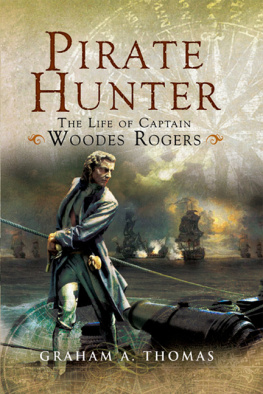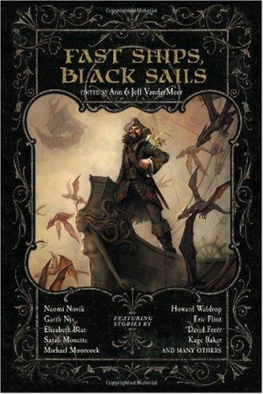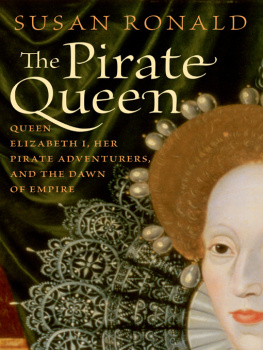James L. Nelson
The Pirate Round
To Elizabeth Clare Nelson, my beloved daughter
I am bound to Madagascar, with the design of making my own fortune, and that of all the brave fellows with me.
Thomas Tew
THE CHIEF targets of those who sailed the Pirate Round to the Red Sea and the Indian Ocean were the treasure ships belonging to the ruler of India, the Great Mogul, who demanded and received vast tribute from the many lands united under his rule.
The Moguls were descendant from Muslim invaders who conquered and ruled India, a largely Hindu land, from 1526 until their power waned in the 1730s. Despite their despotic rule, trade and commerce flourished under the Moguls, and the ships outbound from India with rich cargoes and then returning with the proceeds of their trading voyage were also enticing to the pirates.
Other targets of the Red Sea Rovers were the ships carrying well-heeled pilgrims to Mecca. In all, the wealth that flowed back and forth across the Indian Ocean was staggering, without parallel in the Christian world.
The Pirate Round is set in 1706-7, quite some time before anyone was overly worried about respecting other cultures. Only the staunchest moralists saw anything wrong with robbing dark-skinned non-Christians. Moralists, and the wealthy merchants who ran the various East India companies, whose lucrative trade was threatened as the Great Mogul became increasingly incensed by the depredations of European pirates.
To the pirates, and most Europeans at the time, any dark-skinned non-Christian was considered a Moor, like Shakespeares Othello. It was a catchall that included Muslims, Hindus, Arabs, Indians, and the people of North Africa. In this book I have retained the word and use it as it was meant in the early eighteenth century.
J.L.N.
THE AIR was hot, the wind steady. It blew down the length of the Red Sea, funneled through the straits of Bab el Mandeb, swept over the little island of Perim, which the pirates called Babs Key. A regular fifteen knots, but it brought no relief from the crushing heat.
The Amity sloop was moving well in that wind. Not her fastest, but well. She was under fighting sail, reduced canvas that would make her easier to handle during the coming action, keep her stable for laying the great guns.
Thomas Tew stood on the low quarterdeck, rigid, pressed against the weather rail. Grains of sand, swept up from the deserts of Arabia to the north and carried along on the wind, stung his face like tiny biting insects. They worked their way into his clothing, clung to the sweat that coated his body under his shirt, waistcoat, coat, and breeches.
He envied the men forward, crowded into the sloops waist, stripped down, bare-chested, barefooted. He wished he could be in such a state of undress, but he could not. It was not for him, the captain of the Amity, the famous Thomas Tew, the fabulously wealthy Thomas Tew, to go into a fight dressed like a common sailor.
In fact, he was wearing his best suit of clothes, rich burgundy silks and cotton, silver buckles that gleamed so bright he could not look at them.
It was not a status he had enjoyed long. Three years before, when he had set sail from Newport, Rhode Island, with a commission to take the French factory at Goorie on the Gambia River, he had been no more than one of many, many minor privateer captains, the commander of a small sloop and sixty-odd men. Back then he had not worn such fine clothes on the quarterdeck. He had not even owned such things. He had not been wealthy, or famous.
Wealth and fame came after, and it started with the most important decision of his life, which was to not go to the Gambia at all. Rather, he called his men aft, told them that, former plans notwithstanding, there was little to be gained in Africa and great danger in gaining it. The Red Sea should be their destination, their goal the great ships that brought annual tribute to the Mogul of India from all the lands over which he ruled.
It was a plan that was greeted with enthusiasm. A gold chain or a wooden leg, the men cried, well stand by you!
That was in 1692, and now, three years later, Tew could not help but recall that time, being as it was so very like his current situation. The Red Sea, the Great Moguls treasure ship, the eager men of the Amity ready at the guns, small arms draped from sword belts and shoulder belts, pistols clutched in sweating hands.
They had searched for months, back in 92, and had seen nothing. Then, just past the straits of Bab el Mandeb, they happened on the great, wallowing treasure ship-a huge, high-sterned, gilded monstrosity, a row of great guns jutting from her slab side, three hundred dark-skinned, turban-clad soldiers protecting the riches in her belly. One well-laid broadside from her huge cannon could have swept the Amity from the sea, one coordinated rush of the soldiers would have trampled the meager sixty Rhode Island privateersmen underfoot.
It was folly to attack, but attack they had, blasting away with round and grapeshot, rushing up her sides, falling on the defenders like the screaming furies of hell. The three hundred who sailed in defense of the Moguls treasure stumbled over one another to flee in the face of them. The Indian soldiers flung aside muskets and swords and lances, raced belowdecks, fell to their knees in supplication.
Fifteen minutes of inconsequential fighting and the Yankees had in their possession a fortune the likes of which had not been seen in the Western world since the heyday of the Spanish treasure ships. A hundred thousand pounds in gold and silver, gems, pearls, ivory, spices, silk. It was staggering. They sailed to St. Marys, a tiny island off the northeast coast of Madagascar, divided the booty in the way of the pirates. Three thousand pounds sterling for every man aboard, and double that for the captain.
They made Newport in April of 1694, like Caesar returning triumphant to Rome. Tew, the little-known privateersman, was now feted in every great house in town. He and his wife and his two daughters were the special guests of Governor Fletcher of New York. Wherever he went, men and women wanted to meet him, to hear his tales of Arabia and the East Indies. He was a celebrated gentleman. That ugly word pirate was rarely applied to him, and never by anyone of import.
That was nearly two years before, and here he was again. A different man-wealthy, renowned-but on board the same ship, on nearly the same patch of water, looking at a treasure ship three cable lengths away. High-sided, clumsy, heavily armed and ornate, she looked very like the one that had made his fortune.
Oh, Lord, why ever am I here? he thought.
The pressure had been overwhelming. All the young men of substance had begged him to go out again, and take them along. Servants ran away from their masters and pleaded to join in on another venture to the Red Sea. Wealthy patrons had offered to underwrite the voyage for a percentage of the profit. Thomas Tew had had eight months to enjoy his newfound fortune and the company of his wife and daughters before he had been convinced to sally forth again.
We shall take this big bastard, and then we are for Newport once more, he thought.
Tew took a few steps forward, felt the sweat running under his clothes. The pitch between the deck planks, made soft and gummy by the terrible sun, stuck to his shoes and resisted his efforts to lift his feet and move. He put his hand down on the cap rail and then jerked it away as the hot, oiled wood burned his flesh. He rested his hand on the pommel of his sword, the other on the butt of a pistol thrust into his belt.
Three years ago, three years ago he had flung himself over the rail of the Moguls ship. He could see the soldiers with their long white coats like dresses, their bound heads, dark skin, bright silk belts, falling to the deck before the attacking Englishmen. Not one of his own men lost. Not one.


